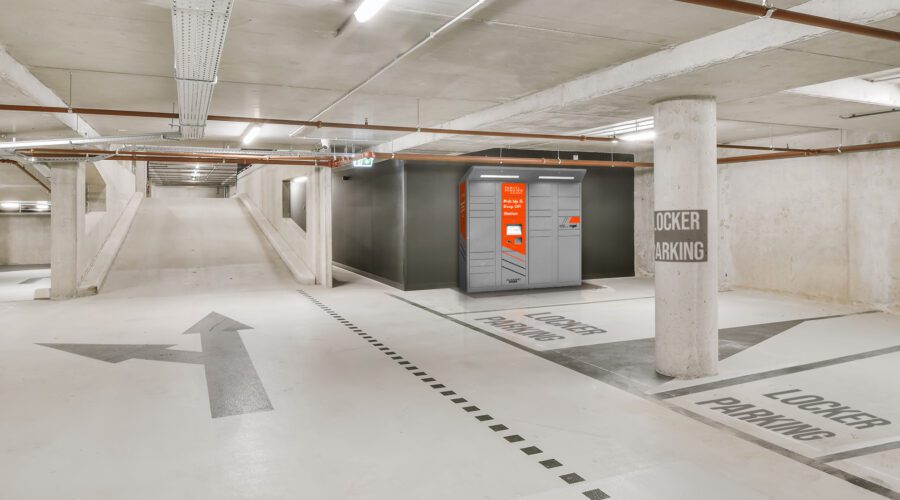
Our Blog
The Future of Parcel & Asset Management at Universities & Student Accommodation Sites
Written by: Parcel Pending
5 Min Read
Published: June 12, 2021
Updated: July 28, 2023
Universities and student accommodation sites handle a rising number of parcels arriving for students and staff every day. Manual, people-based ways of handling these deliveries can be fraught with difficulties such as resourcing, security and levels of contact during handovers. Added to this, books, IT equipment and other assets regularly change hands on site.
The future of package management and asset tracking in higher education (HE) was the topic of discussion at a recent Institute of Government and Public Policy (IGPP) online event.
During the session, Quadient’s UK&I commercial director of parcel locker solutions, Bren Standell, noted that online retail has transformed the way we shop. Students bring their experience of online ordering to their university lives and that includes an expectation of rapid delivery, (next, even same, day) and control over how and when they receive goods.
The delivery landscape – an influx of parcels
Even pre-pandemic, eCommerce was growing with a 2019/20 8% year-on-year increase in UK parcel volumes – a phenomenal 2.8 billion delivered items.
Alongside this, student numbers are rising, with over 2 million full-time students in the UK in that year. Nearly 25,000 new beds entered the market in 2020/21, bringing the total number of student accommodation rooms to 681,000.
More students means more parcels and, on average, it is believed each person will receive 7-10 parcels a month. For a university with 1,000 first-year student beds, that can equate to 250+ parcels per day; even 1,000 a day if there are more than 3,000 students.
Bren asked attendees of the webinar, which included university accommodation managers, directors of campus operations and facilities managers, about students’ online shopping and a comprehensive 90% said they anticipated a significant change in habits after the Covid-19 pandemic.
Movement of items on campus
Added to parcel deliveries there is considerable movement of items on site between faculties, university buildings and amenities. These items include IT equipment, library books, on-campus food and student assignments. Collecting and dropping off such items is restricted if staff and students are held to opening times. What’s more, making these exchanges brings individuals, and sometimes groups, into contact with each other in ways that are increasingly problematic under social distancing conditions.
Higher education is evolving
Striving to manage demands for parcel handling and the movement of items, HE faces a range of challenges including:
- Pressures on space at campus sites and places of residence that impacts parcel storage. As students and staff spend less time on-site, items may have to be held for longer
- Finite staff time to facilitate deliveries and provide administrative services. As parcel volumes go up, this activity doesn’t scale
- Squeezed budgets, particularly if student discounts were given in response to COVID disruption. Costs rise as more parcels place higher demands on resourcing post rooms, yet generating revenue and reducing costs are top priorities
- Limited opening hours for amenities such as post rooms
- Online/blended learning leading to less predictable availability of staff and students on-site to pick up items
- Health and safety considerations with a new emphasis on reducing contact across all activities. Parcels kept in communal areas can be a trip and fire hazard and are messy
- High levels of security impacting courier and visitor movement around sites. Parcel deliveries can contain high-value items, such as laptops – who is responsible for them once they’ve been delivered? Residential parcel theft from unguarded deliveries has increased in recent years
- Meeting student expectations and supporting wellbeing. Delays in receiving ordered items negatively impacts the student experience and can add to stress
- Value for money for students who expect amenities that are convenient, simple to use and that support their lifestyle and needs.
The health & well-being priority
In another session poll, attendees shared their top concerns for a safe return to campus in September. An overwhelming 70% cited health and wellbeing. There is a need to reduce contact between students, members of staff and external visitors, including couriers delivering to sites. This puts added pressure on processes for the management of parcels and the movement of items.
Quadient speaks regularly with universities, some of them managing 400 parcels per day. A minimum manual process of receiving a parcel, logging its arrival, storing it, contacting the relevant student or staff member, validating their ID and handing over the parcel, takes six minutes each time. Multiply that by the total parcels received each day and the number of staff required is not cost-effective. Add into the mix the other items regularly changing hands and moving around campus, and the challenge is too much without automation and smart storage.
Smart parcel lockers for higher education
Technology provides a way to transform processes for incoming parcels and the movement of goods. Carrier agnostic secure university lockers store items until recipients are ready to collect. That means no need to increase resourcing, security is improved, staff and students can collect when it suits them 24/7; there are no more queues at post rooms, parcels no longer pile up in communal areas and contact is reduced.
Staff gain the support they need to take care of parcel delivery and the transfer of items around sites so they can focus on student wellbeing.
The locker system is modular, so the right number of boxes, and range of sizes, can be installed according to need, inside or outdoors, and be added to as required. Items are scanned on delivery and recipients selected and the parcel placed into an appropriately sized secure indoor or outdoor locker.
Recipients are notified electronically with a unique PIN and barcode. They collect their parcel when it suits them by entering the code or scanning the barcode. Staff don’t need to be present. The system provides traceability with an electronic record of deliveries and collections.
For more on the future of package management and asset tracking in HE, access the replay of the IGPP event.
To find out more about 24/7, self-service parcel pick-up solutions, take a look at smart parcel lockers for higher education and Campus Hub, which utilises smart lockers for the movement of items around sites as well as parcel pick-up for non-resident students.



